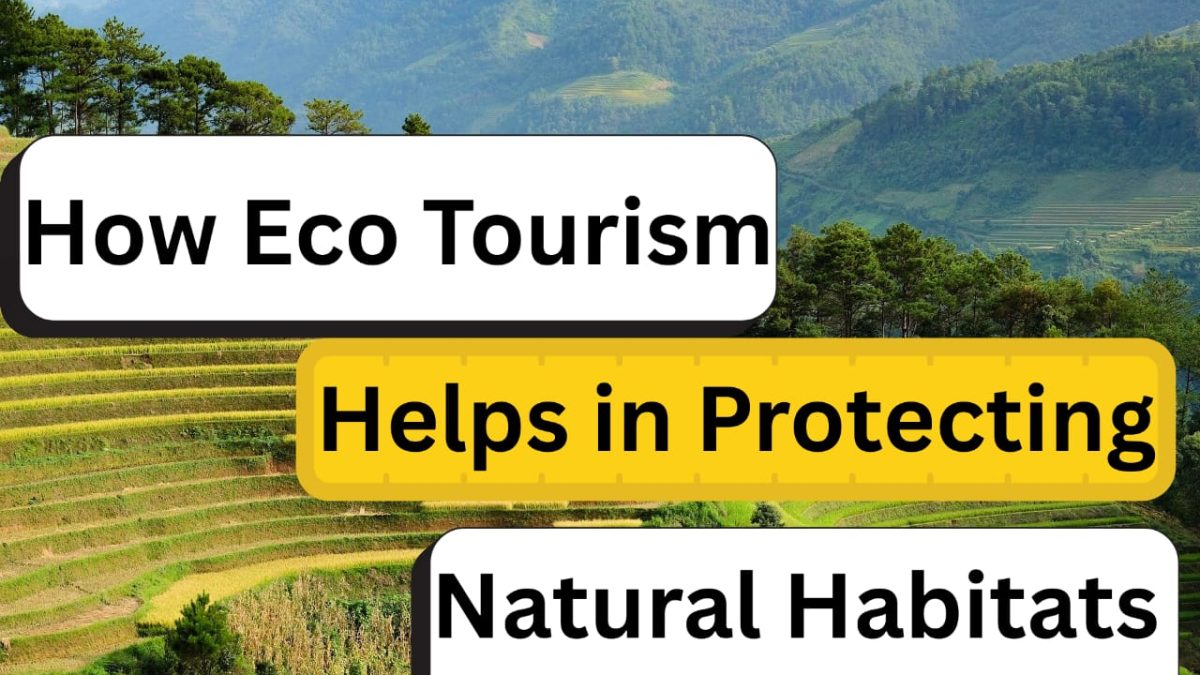How Eco-Tourism Helps in Protecting Natural Habitats

Amadeus GDS: Latest Updates and Features for Students
5 March 2025
How Hotels are Becoming Sustainable
1 April 2025
Categories
Tags
- 10 Benefits of Travel and Tourism
- Benefits of Galileo for travel agents
- Best Companies to do Job in Travel and Tourism Industry in India
- Career in Travel and tourism in India
- Certificate course in travel and tourism
- How to choose the right travel and tourism course in India
- How to Make Career in Travel and Tourism Industry
- Is travel and tourism a good career option in India
- Is Travel and Tourism good career in India
- Job opportunities in Travel and Tourism Industry
- Skills required to make Career in Travel and Tourism Industry
- Soft skills required in the travel and tourism industry
- Travel and Tourism
- Travel and Tourism career opportunities
- Travel and Tourism career salary in India
- Travel and tourism courses after 10th
- Travel and tourism courses after 12th
How Eco-Tourism Helps in Protecting Natural Habitats
Eco-tourism allows people to explore nature responsibly while ensuring that natural habitats remain protected. It promotes sustainable travel, which helps conserve wildlife, supports local communities, and educates travelers about the importance of the environment. Here’s how eco-tourism helps preserve nature:
-
Protects Wildlife and Ecosystems
-
Eco-tourism provides financial support to national parks, wildlife reserves, and marine sanctuaries.
-
The money collected from entrance fees and tourism activities helps fund conservation projects and protect endangered species.
-
Many eco-tourism initiatives promote responsible wildlife interactions to ensure that animals and their habitats are not harmed
-
Minimizes Environmental Damage
-
Unlike mass tourism, eco-tourism focuses on low-impact activities such as hiking, birdwatching, and snorkeling.
-
Eco-friendly hotels and lodges use sustainable materials and energy-saving technologies to reduce their carbon footprint.
-
Visitors learn responsible practices, including waste management and respecting natural surroundings.
-
Supports Local Communities
-
Eco-tourism creates job opportunities for local people, reducing reliance on harmful activities like deforestation and poaching.
-
Many eco-tourism programs encourage the sale of local handicrafts and products, boosting the local economy.
-
Community-run lodges and homestays allow travelers to experience local traditions while supporting the livelihoods of local families.
-
Encourages Reforestation and Habitat Conservation
-
Some eco-tourism programs involve tree-planting activities to restore forests and reduce carbon emissions.
-
Protected eco-tourism areas prevent deforestation and limit overdevelopment in sensitive ecosystems.
-
Projects like mangrove restoration help protect coastlines from erosion and support marine life.
-
Educates People About Environmental Issues
-
Eco-tourism helps visitors learn about climate change, biodiversity loss, and sustainable living.
-
Guided eco-tours highlight the importance of protecting nature and teach responsible travel habits.
-
Tourists often return home as advocates for environmental conservation, spreading awareness in their communities.
-
Controls Over-Tourism and Protects Fragile Areas
-
Many eco-tourism destinations limit the number of visitors to prevent overcrowding and habitat destruction.
-
Strict guidelines ensure that tourists follow eco-friendly practices to reduce their impact on the environment.
-
Some destinations have seasonal tourism schedules to allow ecosystems time to recover.
-
Promotes Ethical Wildlife Tourism
-
Unlike some wildlife tourism practices, eco-tourism avoids any activities that exploit or harm animals.
-
Ethical wildlife experiences, such as safaris and marine conservation dives, follow strict conservation guidelines.
-
Rescue centers and sanctuaries provide safe spaces for animals rescued from captivity or mistreatment.
-
Supports Scientific Research and Conservation Efforts
-
Eco-tourism often collaborates with scientists and researchers to study wildlife and ecosystems.
-
Travelers can join citizen science programs and contribute to conservation projects.
-
Tourism revenue helps fund research on endangered species and habitat protection.
-
Encourages Green Travel and Sustainable Practices
-
Eco-tourism promotes eco-friendly transportation options like cycling, walking tours, and electric boats.
-
Tourists are encouraged to use biodegradable products, avoid plastic waste, and respect local traditions.
-
Sustainable travel certifications help travelers choose responsible hotels and tour operators.
-
The Future of Eco-Tourism
-
More countries are creating policies to balance tourism with environmental conservation.
-
New technologies, such as solar-powered accommodations and electric Transport, make travel more sustainable.
-
As eco-tourism continues to grow, it can play a major role in global conservation efforts.
Conclusion






